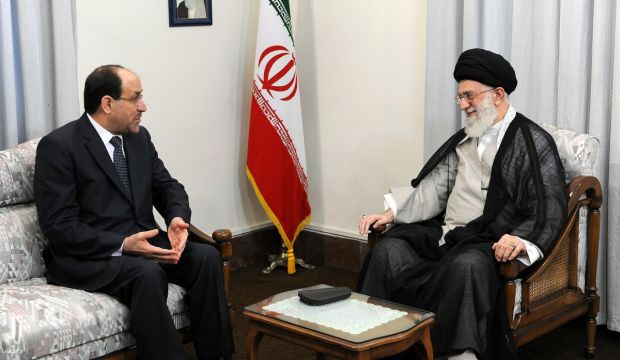
Iran’s Supreme Leader Ayatollah Ali Khamenei meets with former Iraqi prime minister and vice president Nuri Al-Maliki in Tehran, Iran, in this October 18, 2010 file photo. (Reuters/HO/Official Website of Iran’s Supreme Leader)
Ankara, London and Erbil, Asharq Al-Awsat—Iraq’s former prime minister and vice president Nuri Al-Maliki has returned to the country after a visit to Iran, his media spokesman confirmed.
Speaking to Asharq Al-Awsat, Abbas Al-Mussawi said Maliki landed in Baghdad on Wednesday after a two-day visit to Tehran during which he met with top Iranian officials and Iran’s Supreme Leader Ayatollah Ali Khamenei.
Maliki could now face trial in Iraq over his alleged connection with the fall of the country’s second city Mosul to the Islamic State of Iraq and Syria (ISIS) in June 2014. Mussawi insisted there had been no restrictions on the former PM re-entering the country on Wednesday.
A parliamentary report submitted to Iraq’s judiciary on Monday blamed Maliki and several top military commanders for ISIS’s takeover of the city. Maliki has said he rejects the allegations and has instead blamed Turkey and Iraq’s Kurds for supporting ISIS and aiding its advance across large swaths of Iraq.
On Tuesday Turkish Foreign Ministry spokesman Tanju Bilgiç said Maliki was only blaming Turkey due to “feeling guilty” over his role in Iraq’s current problems. According to Turkish news agency Anadolu, Bilgiç said it was the former PM’s “discriminatory and exclusionary policies” that had led up to the current situation in Iraq and that he was the “chief architect” of the country’s misfortunes.
“Ex-prime minister Maliki’s irrational remarks, which accuse our country of supporting Da’esh, cannot be taken seriously,” he said, using the Arabic acronym for ISIS.
Meanwhile, on Thursday Iraqi Kurdistan region President Massoud Barzani’s term in office came to an end.
The Kurdistan Consultative Assembly voted on Monday for Barzani to remain in his post and retain full executive powers until the next election is held.
A number of Kurdish political parties including the Kurdistan Democratic Party (KDP) want to hold early elections or reach a quick consensus on the new president.
“Choosing to hold early elections would be the better choice if all Kurdish political sides do not reach consensus on the matter during the next 10 days,” Fersat Sufi, an MP for the KDP, told Asharq Al-Awsat.
On Wednesday the region’s parliament suspended an emergency session meant to reach an agreement on the decision after a number of MPs boycotted the vote, a walkout led by 38 members of the KDP
On Monday, the United States’ special envoy to the US-led anti-ISIS coalition and British Ambassador to Iraq Frank Baker attended a meeting with representatives from 16 Kurdish political parties to discuss the issue of extending Barzani’s presidency, Muhammad Haji Mahmud, the general secretary of the Kurdistan Socialist Democratic Party (KSDP), said.
He told Asharq Al-Awsat both McGurk and Baker told Kurdish parties the US and UK were keen for Barzani to extend his presidency by another two years in order to support stability in the Iraqi Kurdistan region.
“The input of the US and UK will help find a solution . . . we are slowly moving toward a resolution to the situation,” Mahmud said.
Dalshad Abdullah contributed additional reporting from Erbil.
